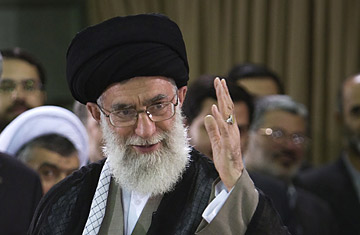
Iran's Supreme Leader Ayatollah Ali Khamenei
(4 of 4)
'Ahmadinejad Win No Longer a Done Deal,' June 15, 9:30 p.m. IRT
Reports out of Tehran describe security forces shooting at protesters. No word yet on how widespread this shooting is or on casualties. (To see a photo from one of the incidents, click here. Be warned that the photo contains graphic content.) Trita Parsi, a U.S.-based Iran expert and head of the National Iranian-American Council, tells TIME that the hundreds of thousands of opposition supporters on the streets today have been emboldened by Supreme Leader Ayatullah Ali Khamenei's backing down from his initial certification of the election result. "He came out first and said the results were certified, and people said he could not reverse himself," says Parsi. "Now he has, and the Guardian Council has asked for 10 days rather than the traditional three to verify the results. Even if they still try to cheat, the message to Iranians is that the re-election of Ahmadinejad is no longer a done deal. They're protesting now not just because they're angry but because they believe they can win. It seems like a psychological barrier has been overcome. They've seen [opposition leader Mir-Hossein] Mousavi stand firm and refuse to be intimidated by threats against him. People were warned that the authorities might shoot at them, but still they came out in the hundreds of thousands today. They've lost their fear. And state TV is carrying images of the demonstrations, which they've been avoiding. Something very important is happening here." — Tony Karon
Ahmadinejad's Shock Troops, June 15, 9:27 p.m. IRT
The thugs at the forefront of the effort to crush protests against Iran's election result have been the Basij militia, which has waded into opposition crowds with flailing batons. This 2005 piece by TIME's Azadeh Moaveni explains the origins of the group, which comprises thousands of young men organized into neighborhood militias. "The militia, whose name means mobilization in Persian, was created by Ayatullah Khomeini in the 1980s to recruit young men to fight against Iraq. But a decade later, they took on the role of an official morality police, becoming better known for raiding parties than for raiding the Iraqi front line." In 2005, she says, they took on an unprecedented function when they got out the vote that propelled Ahmadinejad into the presidency by a landslide. Now, it appears, they're being deployed to ensure he remains in office.
Wired: Online Activists Attacking Government Sites, June 15, 9:44 p.m. IRT
Wired.com reports that "pro-democracy activists on the Web are asking supporters to use relatively simple hacking tools to overflood the regime's propaganda sites with junk traffic."
AP Photographer: 1 Dead As Militia Fire on Rally
Gunmen have fired on opposition protesters at a massive march over alleged election fraud, killing at least one person. (To see a photo from the incident, click here. Be warned that the photo contains graphic content.)
An Associated Press photographer saw one person shot dead and several others who appeared seriously wounded in Tehran's Azadi Square. The shooting came from a compound for volunteer militia linked to Iran's powerful Revolutionary Guard.
The gunfire on Monday came after more than 100,000 opponents of President Mahmoud Ahmadinejad streamed through Tehran. They were not challenged by security forces despite an earlier ban on rallies for reformist leader Mir-Hossein Mousavi.
Disputes over alleged vote-rigging in last week's elections have touched off days of rioting in Tehran. —AP
Click center arrow to watch footage from Azadi Square.
The Ayatullah's Tactical Shift, June 15, 4 p.m. IRT
Iranian state TV reports that Supreme Leader Ayatullah Ali Khamenei has ordered the Guardian Council, an unelected clerical body that oversees elections in the Islamic Republic, to investigate complaints from opposition candidates of electoral fraud. At the same time, the authorities banned opposition rallies, although that didn't stop some 200,000 from gathering in Tehran to support opposition candidate Mir-Hossein Mousavi. Khamenei's decision may be a smart tactical retreat from his premature endorsement of the results on Friday — the Electoral Commission is supposed to wait three days and hear complaints over any irregularities before presenting the results to Khamenei for certification. (The haste with which the results were declared was a prime reason for many to question their authenticity.)
Ordering the Guardian Council, dominated by conservatives loyal to Khamenei, to take up Mousavi's complaint takes away the main demand around which the opposition is rallying on the streets — the allegation that the state has not followed its own laws during the election. By taking up Mousavi's complaints through the proper legal channels, Khamenei creates an acute dilemma for the opposition: the Guardian Council will deliver an answer only sometime next week, and if protests are suspended pending its outcome, it may be harder to get people back on the streets later. But an opposition that is demanding that the law be applied may find it hard to keep crowds on the street in defiance of the law. — Tony Karon
